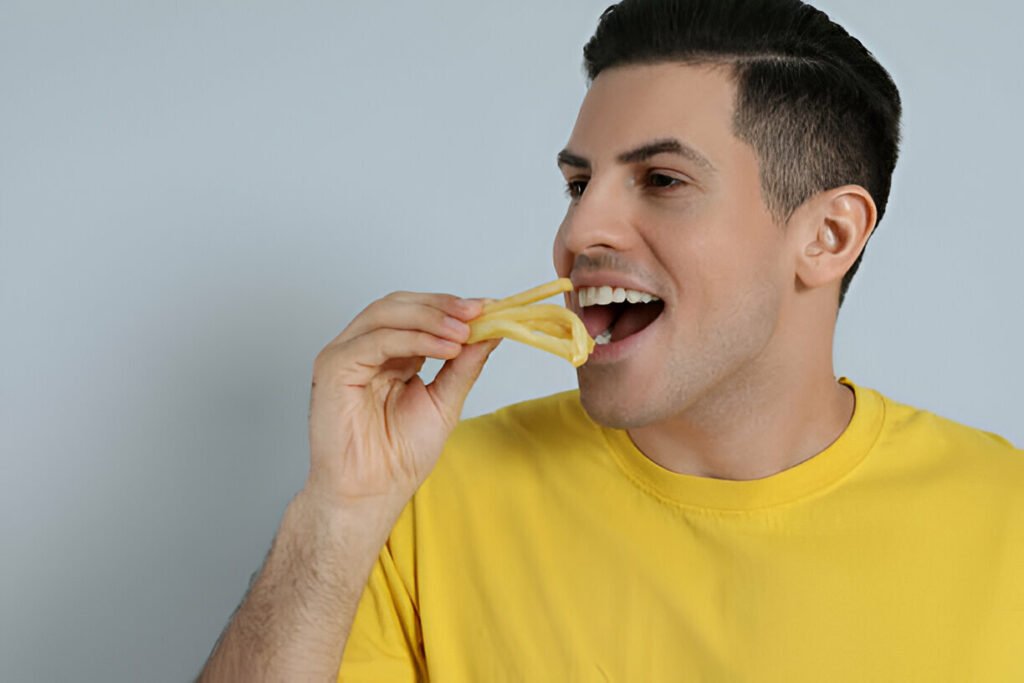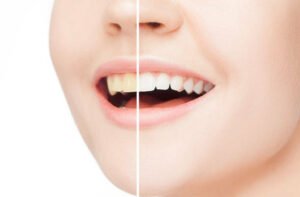Bonding your teeth is a popular procedure that helps restore damaged or discoloured teeth. Composite resin is applied to your teeth to reshape them, fill in gaps, and improve your smile. But once your teeth are bonded, you might wonder: can you still enjoy your favourite snacks, like chips? In this article, we’ll look at whether it’s safe to eat chips with bonded teeth, how bonding affects your eating habits, and how to care for your teeth to make sure they last longer.
What Are Bonded Teeth?
Bonded teeth are teeth that have undergone dental bonding. The process involves applying a tooth-coloured composite resin to a tooth to correct various dental issues such as cracks, chips, or gaps. Once the resin is applied, it is hardened using a special light. The result is a natural-looking tooth that blends seamlessly with the surrounding teeth. Bonding is often a cost-effective and fast alternative to other cosmetic dental procedures like crowns or veneers.
Can You Bite into an Apple with Composite Bonding?
Can You Eat Chips After Dental Bonding?
The short answer is yes; you can eat chips with bonded teeth. However, there are a few important factors to consider to ensure that your bonded teeth remain intact and functional.
1. The Type of Chips You Eat
Chips come in different forms. Crunchy, hard chips, like some crisps, may pose a risk to your bonded teeth. Hard snacks can potentially damage the bonding material, especially in the first few days after the procedure when the resin is still settling. So, while you can eat chips, it’s best to avoid very hard ones for the first few days or weeks.
2. The Strength of Bonding Material
Bonding material is durable, but it’s not as strong as natural tooth enamel. While you can eat regular chips in moderation, biting into very hard items such as nuts, ice, or hard candy should be avoided, as these can cause the bonded material to chip or crack.
How Long Does Composite Bonding Usually Last?
3. Chewing Habits Matter
If you tend to bite into chips with the same tooth that has bonding, it could be more vulnerable. For example, if you’re prone to biting into chips with your front teeth, you may want to consider chewing with your back teeth instead. Chewing with your back teeth can help protect the bonded ones from excessive pressure and wear.
How To Care for Bonded Teeth While Eating
To keep your bonded teeth in good condition, here are a few tips on how to care for them while eating chips and other foods:
1. Avoid Biting Down on Hard Foods
Even though chips are generally safe for bonded teeth, it’s still important to be cautious. Hard foods, such as raw vegetables, tough meats, and some hard chips, should be eaten carefully. If you’re biting into a hard food, try breaking it up into smaller pieces first.
2. Don’t Overuse Your Bonded Teeth for Chewing
Bonded teeth are durable, but they can wear down over time. For this reason, you should avoid overusing the bonded teeth for tasks like chewing hard objects, biting your nails, or opening packages. It’s better to use your back teeth for these tasks and spare the bonded ones from excessive pressure.
Aberdeen Composite Bonding 101: What Is It and How Does It Work?
3. Be Mindful of Hot and Cold Foods
While chips themselves are usually not too hot or cold, some foods and drinks may be. Bonding material can be sensitive to extreme temperatures, which could cause discomfort. It’s a good idea to avoid very hot or very cold foods immediately after getting your bonding procedure done. Gradually, you’ll become more accustomed to different temperatures, but being cautious at first is a good idea.
4. Regular Dental Checkups
After having bonding treatment, you should visit your dentist regularly for checkups. Your dentist will ensure that the bonding material is still in good condition and hasn’t been worn down. Regular checkups are important for catching any early signs of damage to your bonded teeth and addressing them before they become serious.
What Are the Risks of Eating Chips with Bonded Teeth?
While eating chips with bonded teeth is generally safe, there are a few risks involved:
- Chipping the Bonding: As mentioned earlier, hard chips or snacks may cause the bonding material to chip or crack. This is especially true if you eat chips that are too hard or chew on them too aggressively.
- Staining: Although bonding material is stain-resistant, it is not completely immune. Eating chips with strong seasoning or colourants could cause slight discolouration over time, particularly if you don’t maintain good oral hygiene.
- Wear and Tear: Chewing chips regularly, especially if they’re hard, could cause gradual wear on the bonded material. Over time, this could affect the appearance of the bonding and potentially lead to the need for a touch-up.
Conclusion
In conclusion, it’s perfectly fine to eat chips with bonded teeth, as long as you take certain precautions. Choose softer chips and avoid hard, crunchy snacks right after your bonding procedure to protect the material. Also, maintain healthy chewing habits and use your back teeth for tougher foods. Regular dental visits and proper oral care will help keep your bonded teeth looking great for longer.
Bonding is an excellent option for improving the appearance of your smile, but it’s important to protect your new teeth to ensure they last. By following the tips outlined above, you can continue enjoying your favourite foods, including chips, without worrying about damaging your teeth.
Book your consultation today!
Protect Your Smile with Dental Bonding at Bridge St Aesthetic and Dental Implant Clinic
If you’re looking to improve your smile and restore damaged teeth, dental bonding could be the perfect solution for you. At Bridge St Aesthetic and Dental Implant Clinic, we offer high-quality dental bonding in Aberdeen, ensuring that your teeth not only look great but function well too. Our expert team is here to help you achieve a flawless smile with long-lasting results.
Contact us today to schedule a consultation and learn more about how dental bonding can enhance your smile. Whether you’re interested in repairing chips, gaps, or discolouration, our skilled professionals are ready to provide the care and attention you need.
Call us now at 01224 588477 or visit our website to book your appointment and take the first step towards a brighter, healthier smile with dental bonding in Aberdeen!
Frequently Asked Questions
How long does dental bonding last?
Dental bonding typically lasts 5 to 10 years with proper care. It may wear down or stain over time, but regular dental checkups and good oral hygiene can extend its lifespan.
Is dental bonding painful?
No, dental bonding is a painless procedure. It usually requires minimal preparation, and local anaesthesia is not typically needed unless for more extensive treatments, ensuring comfort throughout.
Can I eat normally after dental bonding?
Yes, you can eat normally after dental bonding, but avoid very hard or sticky foods immediately after the procedure to ensure the bonding material sets properly and doesn’t chip.
How do I care for bonded teeth?
To care for bonded teeth, practice good oral hygiene by brushing and flossing regularly. Avoid chewing on hard objects like ice, and visit your dentist for routine checkups to ensure the bonding stays intact.
Is dental bonding reversible?
No, dental bonding is not reversible. Once applied, the resin adheres to your teeth, and while it can be removed or replaced, the natural tooth structure may need reshaping. It’s important to discuss your options with a dentist before proceeding.







